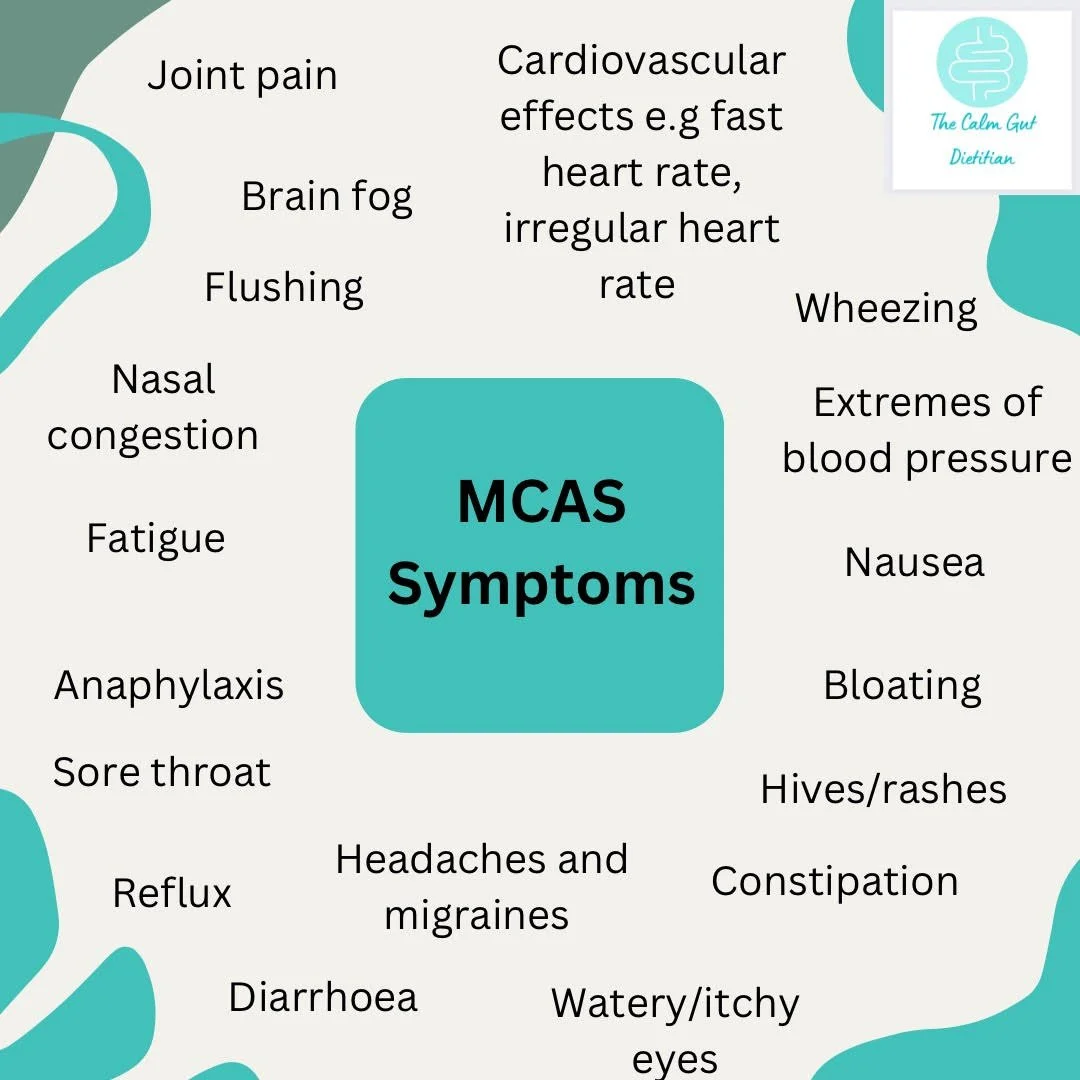
Mast Cell Activation Syndrome (MCAS)
Can a Dietitian help to support you with Mast Cell Activation Syndrome (MCAS)?
The Calm Gut Dietitian is passionate about supporting those with MCAS due to her husband’s journey with the condition. On this page we will look at what MCAS is, the symptoms of MCAS, the role of diet in MCAS, and how a Dietitian can help to support those with MCAS.
Find out more about how a Dietitian can help to support those with MCAS by reading my article for the British Dietetic Association (BDA)
What is Mast Cell Activation Syndrome (MCAS)?
A mast cell is a blood cell that plays an essential role in our immune system (1). These usually release chemicals such as histamine, prostaglandins e.t.c in response to threats such as an infection (2). These chemicals cause our body to respond in various ways such as inflammation and swelling, widened blood vessels, increased mucus production and changes in tissues structure.
MCAS causes whole body symptoms as a result of oversensitive or inappropriately activated mast cells, which causes the body to react to a range of triggers that are usually harmless to most people (3).
Mast Cell Activation Syndrome (MCAS) Symptoms
Those with MCAS repeatedly experience a range of symptoms which can affect every single system in the body and have a huge impact on their health and wellbeing (4).
Mast Cell Activation Syndrome (MCAS) triggers
Every person with MCAS is unique and has their own individual triggers. These can include the following (5, 3):
Dietary triggers such as high histamine foods or alcohol.
Environmental toxins such as mould and scents
Stress
Alcohol
Acute or chronic illnesses
Insect bites or bites that administer venom such as snack bites
Physical stimulation such as pressure or exercise
Rapid changes in temperature
Medications
How is Mast Cell Activation Syndrome (MCAS) treated?
MCAS can’t be cured but there are medications that can help reduce symptoms and stabilise mast cells, in conjunction with avoidance of known triggers (6).
Does diet play a role in Mast Cell Activation Syndrome (MCAS)?
Identifying any dietary triggers can be helpful, however these are very individual and there isn’t a ‘one size fits all’ approach (7). A Dietitian can help guide those with MCAS through elimination diets, such as the low histamine diet or the low FODMAP diet, to identify dietary triggers safely. Certain vitamins and minerals are, also, involved in mast cell stabilisation and histamine break down, so a Dietitian can help to support you with ensuring that you are having enough of these vitamins and minerals in your diet (3).
The low Histamine Diet can be helpful for some people with MCAS, however histamine is only one of the many mediators produced by the mast cells so you may continue to have symptoms despite a low histamine diet (8). The diet should be followed for 2-4 weeks followed by systematic re-introduction of foods to identify individual tolerances to food. This diet can be very restrictive and should only be undertaken with the support of a Registered Dietitian (9).
Can a Dietitian help those with Mast Cell Activation Syndrome (MCAS)?
At The Calm Gut Dietitian we acknowledge that every person with MCAS has their own individual triggers and we can help you identify your own personal dietary triggers. I can help support those with MCAS enjoy their food again, maintain a healthy body weight and ensure that you are getting all of the nutrients that your body needs for physical and mental wellbeing.
I have practical experience with cooking, shopping and preparing food for the low histamine diet and the low FODMAP diet and can help support anyone who needs to follow one of these diets or with any other allergies and intolerances.
References1) https://www.mastcellaction.org/about-mcas 2) Molderings GJ, Haenisch B, Brettner S, Homann J, Menzen M, Dumoulin FL, Panse J, Butterfield J, Afrin LB. Pharmacological treatment options for mast cell activation disease. Naunyn Schmiedebergs Arch Pharmacol. 2016 Jul;389(7):671-94. doi: 10.1007/s00210-016-1247-1. Epub 2016 Apr 30.
3) Arun. S., Storan A., Myers B. ‘Mast Cell Activation Syndrome and the link with long covid’ (2022) British Journal of Hospital Medicine. Vol 83. No. 7. DOI https://doi.org/10.12968/hmed.2022.01234) https://www.aaaai.org/conditions-treatments/related-conditions/mcas 5) Akin C. Mast Cell Activation Syndromes. (2017). The Journal of Allergy and Clinical Immunology. Volume 140, Issue 2, P349-355, https://doi.org/10.1016/j.jaci.2017.06.0076) Molderings, G.J., Haenisch, B., Brettner, S. et al. Pharmacological treatment options for mast cell activation disease . Naunyn-Schmiedeberg's Arch Pharmacol 389, 671–694 (2016). https://doi.org/10.1007/s00210-016-1247-17) https://blog.katescarlata.com/2018/02/01/mast-cell-activation-syndrome-part-3-role-nutrition-stress/ 8) https://www.mastcellaction.org/managing-mcas 9) https://www.bda.uk.com/resource/low-histamine-diets-and-long-covid.html










